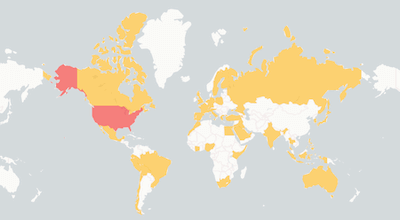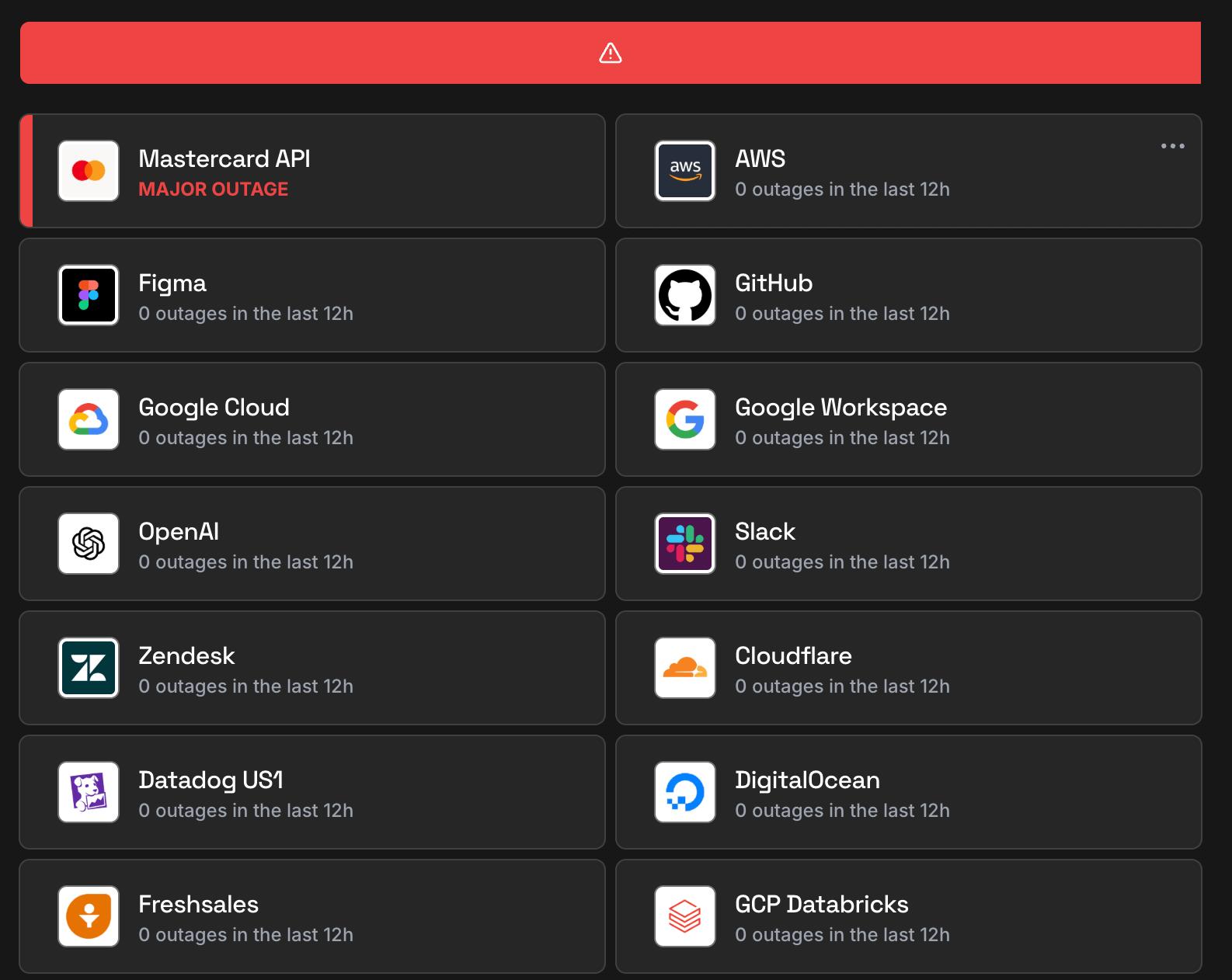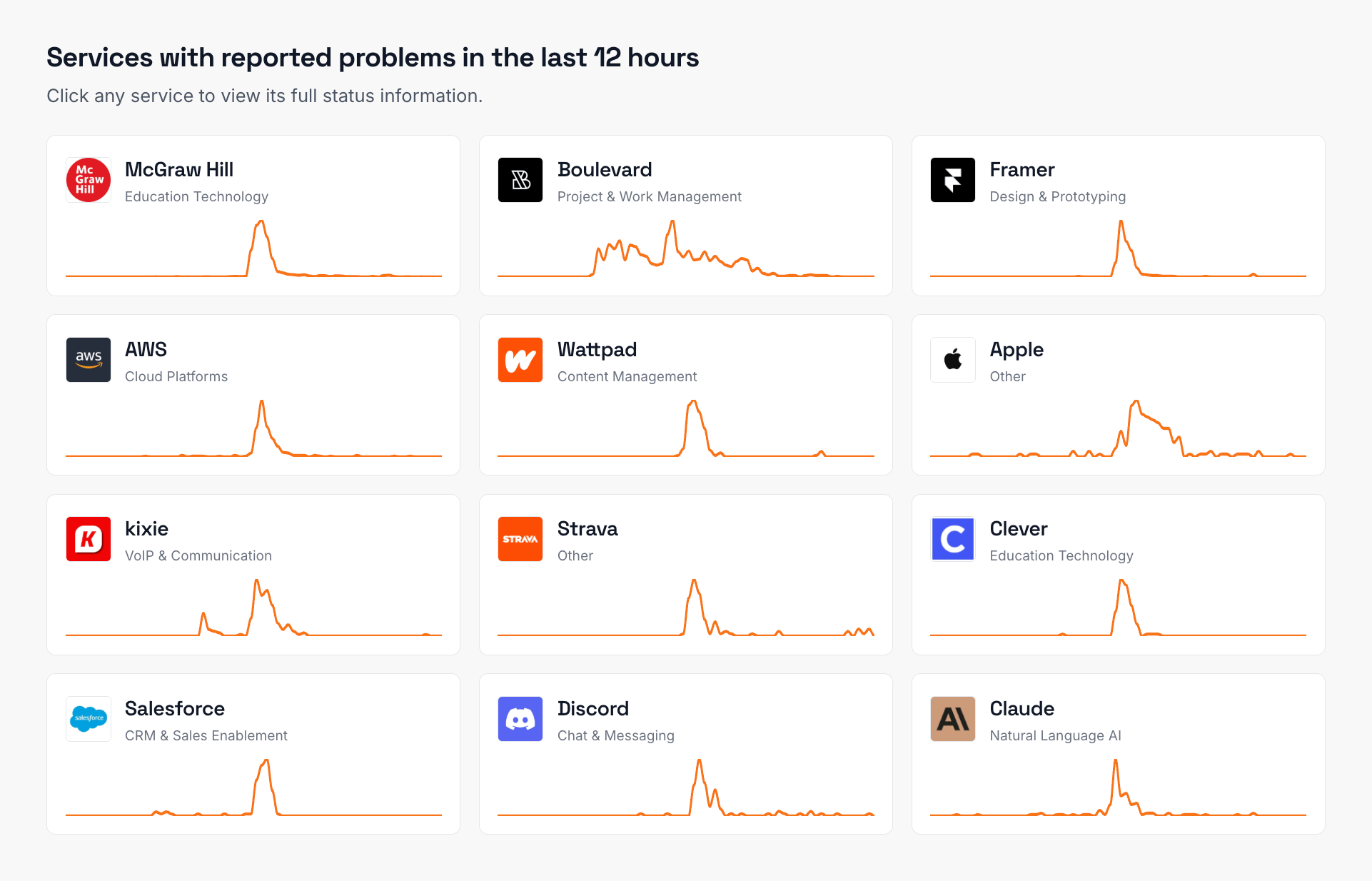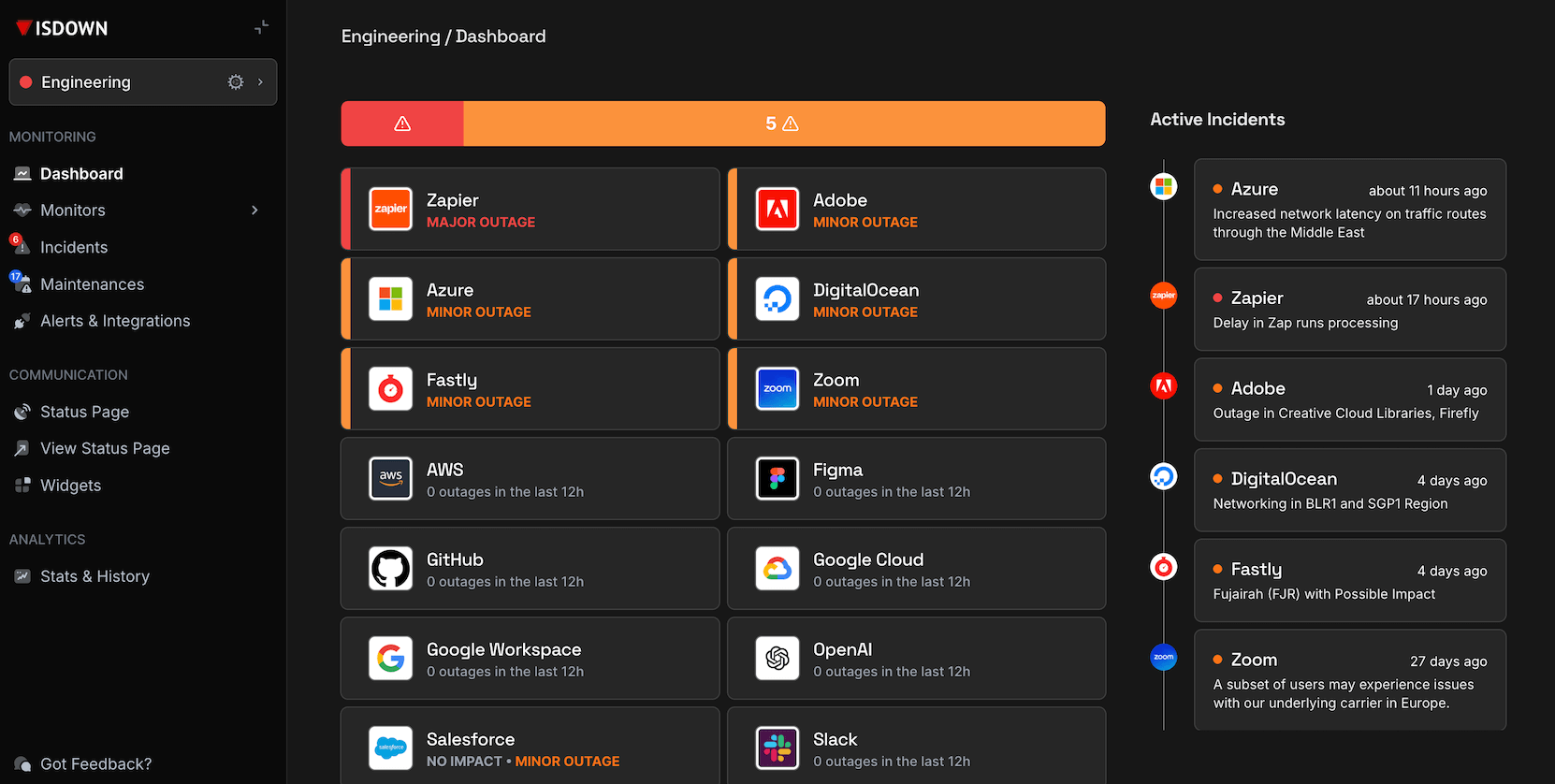Is AlertOps Down?
AlertOps status updated a few minutes ago
What is AlertOps status right now?
AlertOps is working normally
Stop refreshing status pages
IsDown watches AlertOps, and all your other vendors, so you don't have to.
Get AlertOps Outage Alerts14-day trial · No credit card
AlertOps service health over the last 24 hours
This chart shows the number of user-reported issues for AlertOps service health over the past 24 hours, grouped into 20-minute intervals. It's normal to see occasional reports, which may be due to individual user issues rather than a broader problem.
AlertOps Outage Map

See where users report AlertOps is down. The map shows recent AlertOps outages from around the world.
AlertOps Outage MapMonitor AlertOps status and outages
- Monitor all your external dependencies in one place
- Get instant alerts when outages are detected
- Be the first to know if service is down
- Show real-time status on private or public status page
- Keep your team informed
Latest AlertOps outages detected by IsDown
Check AlertOps status history below. IsDown detects when AlertOps is down, tracking both official outages and user-reported issues.
| Title | Started At | Duration |
|---|---|---|
|
We are currently investigating an issue with AlertOps. The web site and APIs are both down.
|
Oct 29, 2025 at 04:04 PM UTC
|
about 6 hours |
|
We are experiencing intermittent delivery of outbound SMS with our provider - Twilio.
This is du...
|
Oct 20, 2025 at 05:05 PM UTC
|
about 4 hours |
|
We are currently investigating this issue.
|
Jun 11, 2025 at 11:46 PM UTC
|
24 minutes |
|
Our US VOIP service provider is down. One of their data centers is down. They are working on Fai...
|
Jan 24, 2025 at 02:48 PM UTC
|
about 1 hour |
|
Users of the AlertOps Android mobile app may be experiencing intermittent push notification deliv...
|
Apr 12, 2024 at 01:46 AM UTC
|
about 20 hours |
|
We are currently investigating an issue with processing of inbound API messages. Most incoming me...
|
Dec 11, 2023 at 02:35 PM UTC
|
about 7 hours |
|
At 11:15 the AlertOps web app began to experience intermittent connectivy issues due to a Microso...
|
Sep 07, 2022 at 04:15 PM UTC
|
Ongoing |
|
Between 6/13/22 11:00 pm CST and 6/14/22 00:45 am CST, we identified an issue with receiving inbo...
|
Jun 14, 2022 at 06:45 AM UTC
|
Ongoing |
|
We are currently investigating this issue.
|
Feb 03, 2022 at 08:30 PM UTC
|
Ongoing |
|
AlertOps is currently experiencing Intermittent delays and failures with some outgoing SMS messag...
|
Dec 10, 2021 at 08:39 PM UTC
|
Ongoing |
Get alerts when AlertOps is down
- Monitor all your external dependencies in one place
- Get instant alerts when outages are detected
- Be the first to know if service is down
- Show real-time status on private or public status page
- Keep your team informed
AlertOps Components Status
Check if any AlertOps component is down. View the current status of 4 services and regions.
| Component | Status | Details |
|---|---|---|
| Inbound Integrations status | OK | View details |
| Notifications Delivery Service status | OK | View details |
| Outbound Integrations status | OK | View details |
| Web Application status | OK | View details |
Compare AlertOps vs alternatives
Compare AlertOps status, outages, and service health against alternatives. See which services go down less often.
About AlertOps Status and Outage Monitoring
IsDown has monitored AlertOps continuously since October 2022, tracking this Incident Management for 3 years. Over that time, we've documented 23 outages and incidents, averaging 0.6 per month.
We monitor AlertOps's official status page across 4 components. IsDown interprets AlertOps statuses (operational, degraded performance, partial outage, and major outage) to deliver precise health metrics and filter alerts by the components you actually use.
To check if AlertOps is down, IsDown combines official status data with user reports for early detection. Vendors often delay acknowledging problems, so user reports help us alert you before the official announcement.
Engineering and operations teams rely on IsDown to track AlertOps status and receive verified outage alerts through Slack, Teams, PagerDuty, or 20+ other integrations.
How IsDown Monitors AlertOps
IsDown checks AlertOps's status page every few minutes, across all 4 components. We combine official status data with user reports to detect when AlertOps is down, often before the vendor announces it.
When AlertOps status changes, IsDown sends alerts to your preferred channels. Filter by severity to skip noise and focus on outages that affect your business.

What you get when monitoring AlertOps with IsDown
Track AlertOps incidents and downtimes by severity
IsDown checks AlertOps official status page for major/minor outages or downtimes. A major outage is when AlertOps experiences a critical issue that severely affects one or more services/regions. A minor incident is when AlertOps experiences a small issue affecting a small percentage of its customer's applications. An example is the performance degradation of an application. The moment we detect a AlertOps outage, we send you an alert and update your dashboard and status page.
Get alerted as soon as users report problems with AlertOps
AlertOps and other vendors don't always report outages on time. IsDown collects user reports to provide early detection of outages. This way, even without an official status update, you can stay ahead of possible problems.
All the details of AlertOps outages and downtimes
IsDown collects all information from the outages published in AlertOps status page to provide the context of the outage. If available, we gather the title, description, time of the outage, status, and outage updates. Another important piece of information is the affected services/regions which we use to filter the notifications that impact your business.
Prepare for upcoming AlertOps maintenance events
AlertOps publishes scheduled maintenance events on their status page. IsDown collects all the information for each event and creates a feed that people can follow to ensure they are not surprised by unexpected downtime or problems. We also send the feed in our weekly report, alerting the next maintenances that will take place.
Only get alerted on the AlertOps outages that impact your business
IsDown monitors AlertOps and all their 4 components that can be affected by an outage. IsDown allows you to filter the notifications and status page alerts based on the components you care about. For example, you can choose which components or regions affect your business and filter out all other outages. This way you avoid alert fatigue in your team.
How IsDown Works
Get started in minutes. Monitor all your critical services from one place.
We monitor official status pages
IsDown checks the status of over 5,850+ services every few minutes. We aggregate official status information and normalize it, plus collect crowdsourced reports for early outage detection.
You get notified instantly
When we detect an incident or status change, you receive an alert immediately. Customize notifications by service, component, or severity to avoid alert fatigue.
Everything in one dashboard
View all your services in a unified dashboard or public or private status page. Send alerts to Slack, Teams, PagerDuty, Datadog, and 20+ other tools your team already uses.
No credit card required • 14-day free trial
AlertOps Downdetector vs IsDown
Looking for AlertOps outage alerts like Downdetector? IsDown monitors AlertOps's official status page for verified incident data, not just user reports. Know exactly when AlertOps is down, which components are affected, and when service health is restored. Here's why official AlertOps status monitoring beats crowdsourced detection:
| Features | IsDown | Downdetector |
|---|---|---|
| Official AlertOps status page monitoring. Know when AlertOps is down with real time incident details. | ||
| Monitor 5,850+ services including AlertOps in a single dashboard. | ||
| Instant AlertOps outage alerts sent to Slack, Teams, PagerDuty, and more. | ||
| Combined monitoring: AlertOps official status plus user reports for early outage detection. | ||
| Maintenance feed for AlertOps | ||
| Granular alerts filtering by AlertOps components and regions. |
14-day free trial • No credit card required
Frequently Asked Questions
Is AlertOps down today?
AlertOps isn't down. You can check AlertOps status and incident details on the top of the page. IsDown continuously monitors AlertOps official status page every few minutes. In the last 24 hours, there were 0 outages reported.
What is the current AlertOps status?
AlertOps is currently operational. You can check AlertOps status and incident details on the top of the page. The status is updated in almost real-time, and you can see the latest outages and issues affecting customers.
Is there a AlertOps outage now?
No, there is no ongoing official outage. Check on the top of the page if there are any reported problems by other users.
Is AlertOps down today or just slow?
Currently there's no report of AlertOps being slow. Check on the top of the page if there are any reported problems by other users.
How are AlertOps outages detected?
IsDown monitors the AlertOps official status page every few minutes. We also get reports from users like you. If there are enough reports about an outage, we'll show it on the top of the page.
Is AlertOps having an outage right now?
AlertOps last outage was on October 29, 2025 with the title "AlertOps outage"
How often does AlertOps go down?
IsDown has tracked 23 AlertOps incidents since October 2022.
Is AlertOps down for everyone or just me?
Check the AlertOps status at the top of this page. IsDown combines official status page data with user reports to show whether AlertOps is down for everyone or if the issue is on your end.
What AlertOps components does IsDown monitor?
IsDown monitors 4 AlertOps components in real-time, tracking the official status page for outages, degraded performance, and scheduled maintenance.
How to check if AlertOps is down?
- Subscribe (if possible) to updates on the official status page.
- Create an account in IsDown. Start monitoring AlertOps and get alerts in real-time when AlertOps has outages.
Why use IsDown to monitor AlertOps instead of the official status page?
Because IsDown is a status page aggregator, which means that we aggregate the status of multiple cloud services. You can monitor AlertOps and all the services that impact your business. Get a dashboard with the health of all services and status updates. Set up notifications via Slack, Datadog, PagerDuty, and more, when a service you monitor has issues or when maintenances are scheduled.
How IsDown compares to DownDetector when monitoring AlertOps?
IsDown and DownDetector help users determine if AlertOps is having problems. The big difference is that IsDown is a status page aggregator. IsDown monitors a service's official status page to give our customers a more reliable source of information instead of just relying on reports from users. The integration allows us to provide more details about AlertOps's Outages, like incident title, description, updates, and the parts of the affected service. Additionally, users can create internal status pages and set up notifications for all their third-party services.
Latest Articles from our Blog
Monitor AlertOps status and get alerts when it's down
14-day free trial · No credit card required · No code required



















